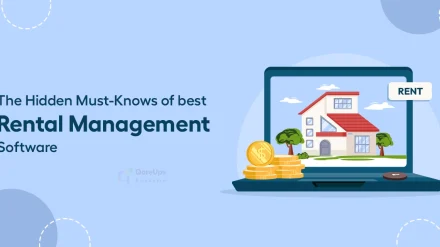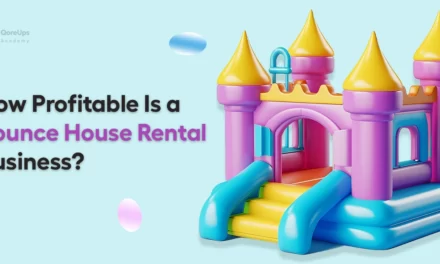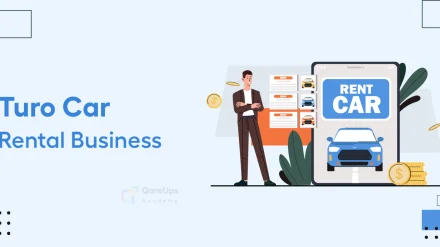The worldwide dumpster rental market is expected to hit around USD 7.8 billion by 2030, with a compound annual growth rate (CAGR) of 3.6% from its 2023 value of USD 5.9 billion.
If you’re an entrepreneur eyeing this market, it’s pretty evident that it offers real possibilities. But like any business, success depends on understanding the basics — and that’s exactly what you’ll be seeing here.
In this blog, we’ll discuss about the profitability, startup costs, equipment, operations, and rental software to help you know what it takes to run a dumpster rental business.
This will give you a strong head start.
Make sure to keep a notepad handy — you’ll want it to capture every tip coming your way!
How Profitable Is a Dumpster Business?
The profitability of a dumpster rental business hinges on several factors. It comprises fleet size, pricing strategy, and operational efficiency.
For instance, an entrepreneur who started with a single dump trailer purchased for $8,000 and rented it out for $300 per day now generates over $50,000 annually in gross profit.
By reinvesting profits into acquiring more trailers, the business has the potential to scale significantly.
With six trailers consistently rented out, monthly gross profits could reach up to $27,000, showcasing the scalability of the model.
Factors That Impact Dumpster Business Profitability
Now, let’s take a look at the key aspects that can influence the profitability of your dumpster rental business.
1. Fleet Size and Utilization
Your dumpster inventory is your income-producing asset. The more dumpsters you own, the more revenue potential you have.
However, fleet utilization (i.e., how often your dumpsters are rented out versus sitting idle) is just as important as fleet size.
- Target a 70–90% utilization rate. This means the majority of your dumpsters are earning revenue most of the time.
- Start lean but scalable. A common path is starting with 2–4 dumpsters, reinvesting profits to grow to 10+ within a year.
- Factor in turnaround time. If your dumpsters are unavailable due to late pickups, repairs, or cleaning delays, you lose potential income.
2. Pricing Strategy
Pricing isn’t one-size-fits-all. It should reflect your market and operational costs. A few smart pricing strategies include:
- Size-based pricing. Larger dumpsters command higher prices, e.g., $300 for a 10-yard and $495+ for a 15-yard.
- Time-based tiers. Offer base pricing for 3, 7, or 14-day rentals. Charge fees for extra days at a daily rate.
- Zone pricing. Add delivery fees for customers outside a core service radius to account for fuel/time.
A Sound Tip: Bundle services (like same-day delivery, pickup, or multiple dumpsters) to provide added value for customers and get higher margins.
3. Operational Efficiency
Running a tight ship is the hidden driver of profitability. Poor operations lead to missed pickups, vehicle downtime, and bad reviews.
- Use route optimization software to reduce fuel costs.
- Track dumpster locations with GPS to prevent theft or misplacement.
- Maintain a tight service window (pickup/drop-off within 24 hours) — reliability wins repeat business.
Train staff on fast and safe loading/unloading, reducing time per job.
4. Market Demand
Demand is strong, especially in these markets:
- Construction sites: Consistent need for debris removal. Build long-term contracts with local builders.
- Home renovations and roofing: Homeowners often need a dumpster for 3–7 days.
- Eviction cleanouts: Property managers frequently need dumpsters to clear out a property after an eviction to make it ready for new occupancy.
- Event cleanup: Event managers often require dumpsters for short-term use to clean up and restore a venue to its pre-event shape.

Now, you have understood the aspects that can influence the profitability. Let’s jump into the next section to know how to get the business started.
How to Start a Dumpster Rental Business?
1. Market Research
Before buying your 1st dumpster, understand:
- Who your local competitors are and what they charge.
- Whether your area has zoning restrictions or landfill access limitations.
- What industries (e.g., roofing, remodeling) are most active in your city or town.
- Seasonal demand patterns. Some areas see higher use in spring/summer.
Use tools like Google Trends, Yelp, and local business directories for this research.
2. Business Plan
A solid business plan should cover:
- Startup costs (expect $15,000–$50,000 minimum for a small fleet).
- Ongoing costs: fuel, landfill fees (often $20–$80/ton), maintenance, and insurance.
- Revenue projections: For example, 4 dumpsters rented 4 times a month at $400 = $6,400/month.
- Your unique selling proposition (USP) — e.g., 24-hour turnaround, eco-friendly disposal, contractor discounts.
3. Licensing and Permits
Every city has different requirements. Typically, you’ll need:
- A business license or LLC registration.
- Waste hauling permits — check with your city or county.
- A DOT number if operating commercial trucks over 10,000 lbs.
- Access to local landfills or transfer stations which often require proof of license and business insurance.
4. Equipment Acquisition
Things that you must have to purchase to start your business include:
- Dumpsters: Start with 10-yard or 15-yard bins (most popular sizes for residential use).
- Roll-off trucks or trailers: Used models can cost $40,000–$90,000, new ones up to $150,000.
- Heavy-duty trailer alternatives: Many beginners use dump trailers instead of full trucks. They’re cheaper and easier to tow with a pickup truck.
Budget for branding/decals, hitch accessories, and backup cameras.
Tip: Start with 2–3 dumpsters, and reinvest profits to expand your fleet.
5. Insurance
Protect your business with:
- General liability insurance: Covers property damage and injury ($1M policy recommended).
- Commercial vehicle insurance: For your truck or trailer.
- Workers’ comp: If you hire employees.
- Some clients (especially commercial) may require proof of specific coverage to work with you.
6. Marketing Strategy
You need a strong online presence from day one:
- Build a website with booking forms, photos, pricing, and contact info.
- Create/subscribe to a rental marketplace for operational efficiency and to make your dumpsters easily rentable.
- Get listed on Google Business, Yelp, and local directories.
- Use Google Ads to target high-intent keywords like “dumpster rental [city].”
- Partner with roofing companies, general contractors, and property managers — offer commission or referral bonuses.
- Wrap your dumpsters and truck with branding — they act as mobile billboards at every job site.
Did you know? Businesses that implement online booking systems see an average 37% increase in total bookings and a 27% increase in annual revenue. This shows that having an online storefront for your dumpster rental business is worth the investment.
7. Customer Service
Excellent service builds your brand:
- Offer clear delivery windows and on-time pickups.
- Use SMS/email notifications to keep customers updated.
- Provide well-maintained dumpsters — aesthetics matter.
- Educate customers on proper loading and prohibited items to reduce contamination fines.

Want the full picture on starting and growing a dumpster rental business? Our ultimate step-by-step guide has you covered! Check out our full guide here.
Essential Equipment and Services in a Dumpster Rental Business
1. Dumpsters
Sizes range by volume and use case:
| Size | Use Case | Project Suitability |
|---|---|---|
| 4-yard | Small cleanouts, office trash | Commercial |
| 10-yard | Small cleanouts, heavy debris (dirt/concrete) | Residential |
| 15-yard | Medium renovation projects | Mid-range |
| 20-yard | Whole-house cleanouts, heavy debris | The “Popular” Size: |
| 30+ yard | Commercial or industrial jobs | Large-scale |
Lighter-duty units may suffice for homeowners, while construction jobs may demand reinforced dumpsters.
2. Roll-Off Trucks
Trucks are essential for moving dumpsters.
Choose between:
- Cable roll-off trucks: Good for heavy-duty hauling.
- Hook-lift trucks: Offer more control and flexibility.
- Flatbed or dump trailers: Great for beginners — can be towed with a heavy-duty pickup truck.
Make sure your truck is rated to handle the full dumpster weight + debris.
3. Storage Facility
You’ll need space to:
- Park your truck and dumpsters.
- Store maintenance tools and safety gear.
- Clean and repair dumpsters between jobs.
Look for commercial lots with gated access, ideally near major roads or service areas.
4. Safety Gear & Operational Tools
For you or your crew:
- Steel-toe boots, gloves, hard hats.
- Backup cameras and dash cams.
- Load scale or estimate sheets to ensure dumpsters aren’t overloaded.
- Toolkits for field repairs and minor fixes.
Top Challenges in Running a Dumpster Rental Business (and How to Overcome Them)
Common challenges include:
Regulatory Compliance
Navigating local zoning laws and waste disposal regulations can be complex. Staying informed and consulting with legal experts can mitigate risks.
Maintenance Costs
Regular maintenance of dumpsters and trucks is essential to prevent downtime. Implementing a routine maintenance schedule can prolong equipment lifespan.
Competition
Some cities may have strong competitors. Differentiating your services through exceptional customer service and unique offerings can help you stand out in a competitive market.
Seasonal Demand
Demand may fluctuate seasonally. Diversifying services and targeting different industries can help maintain steady revenue year-round. The good thing is that rental prices go up during spring and summer.
Using the Best Dumpster Rental Software to Maximize Efficiency
To keep your operations running smoothly and stay ahead of the competition, the best dumpster rental software can make all the difference. Let’s explore how it can streamline and scale your business:
Real-Time Inventory Management: Monitor dumpster availability and location in real-time to optimize scheduling and reduce conflicts.
Online Booking and Payment Integration: Allow customers to book and pay for services online, enhancing rental convenience.
Comprehensive Reporting and Analytics: Analyze business performance, track revenue, and identify areas for improvement.
Customer Relationship Management (CRM): Manage customer interactions, follow-ups, and feedback to build strong relationships.
Mobile Accessibility: Manage your entire operation from your smartphone or tablet, whether you’re on a job site, in transit, or meeting with a client.

Conclusion: Is a Dumpster Business Worth It for You?
The dumpster rental industry offers significant profit potential for entrepreneurs willing to invest time and resources.
With relatively low startup costs, consistent demand, and opportunities for scalability, it’s a viable option for those seeking a sustainable business model.
By having a software for managing dumpster rentals you can manage your rental operations more efficiently, increase your customer satisfaction, and launch effective marketing strategies. Plus, it empowers you to establish a profitable dumpster rental business that meets the needs of your community.
We Have the Best Dumpster Rental Software That Will Help You Launch and Scale Your Business Quickly!






